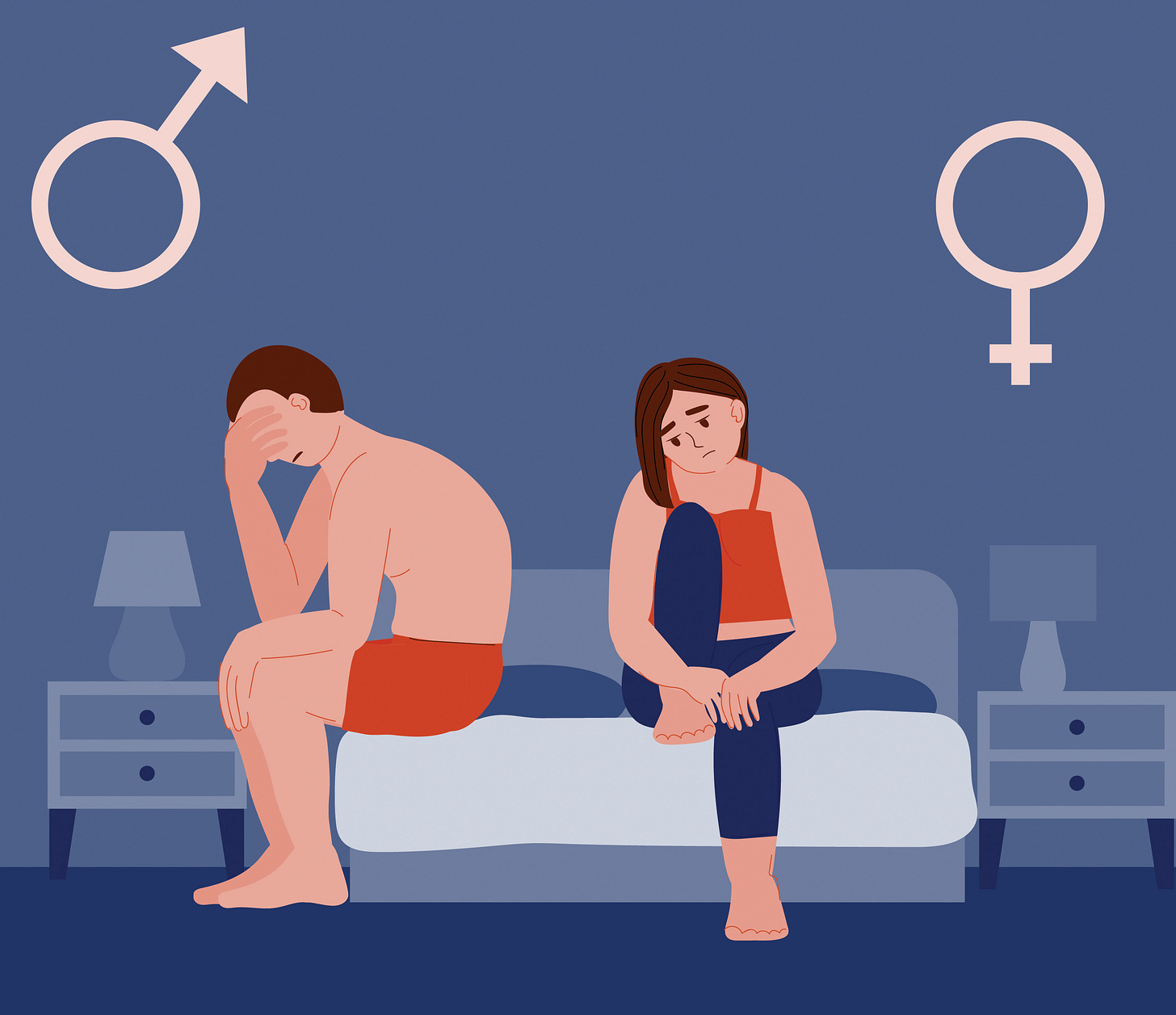Antidepressants can cause 'chemical castration'
Patients are not being warned of persistent, irreversible sexual dysfunction caused by SSRIs
Antidepressants can cause severe, sometimes irreversible, sexual dysfunction that persists even after discontinuing the medication.
Sufferers have described it as ‘chemical castration’ – a type of genital mutilation caused by antidepressants, mainly selective serotonin reuptake inhibitors (SSRIs).
The condition is known as post-SSRI sexual dysfunction (PSSD), a condition largely unrecognised, and the true incidence of which is unknown.
David Healy, psychiatrist and founder of RxISK.org said, “I saw my first patient with PSSD in 2000, a 35-year-old lady who told me that three months after stopping treatment, she could rub a hard-bristled brush across her genitals and feel nothing.”
Josef Witt-Doerring, psychiatrist and former FDA medical officer said, “This condition is so devastating that it will cause serious changes to your life and to those around you.”
It happened to Rosie
In 2020, during protracted covid lockdowns in Melbourne, 23-year-old Rosie Tilli felt an increasing sense of anxiety and depression.
Her psychiatrist prescribed a low dose of Lexapro (escitalopram), an SSRI to help Rosie calm down, assuring her that if she experienced side effects, they’d go away once she stopped the medication.
Soon after taking the medication Rosie felt emotionally blunted, but took it as a positive sign.
“At first, I thought it was great because it felt like the medication was working. But then I couldn’t feel my emotions, I couldn’t cry, I had no sexual desire, and my genitals went numb.”
After four months, Rosie decided to slowly wean herself off the medication. Some of her symptoms improved and the fog lifted, but over the next two years her libido faded to nothing.
“It has been two years of hell. Now, I have no sexual function. I'm numb down there. I can't have an orgasm. It feels like my soul has just been vacuumed out of my body. I feel completely asexual,” said Rosie.
She sought help from various professionals, but none believed it could be the antidepressant because the drug had already left her system. They concluded it was all in her mind.
Rosie went to a local youth centre for help, but they ended up sectioning her under the Mental Health Act with an Involuntary Treatment Order, insisting she take antipsychotic medication.
“I refused to take an antipsychotic because I knew I wasn’t psychotic. Instead, they forced me to take another antidepressant against my will in order to leave the facility,” said Rosie.
“It was the most traumatic thing I’ve ever been through in my life. I felt helpless and my parents just looked on and said, ‘trust the professionals, they know what they are doing’.”
In her clinical notes, the doctors wrote that “Rosie exhibits fixated beliefs of a delusional intensity about ongoing sexual side effects from Lexapro”.
“One psychologist actually asked me if I’d tried seeing a male sex worker to help bring back my libido. I was shocked. They said it would reduce my anxiety and help me get in touch with my body,” said Rosie.
“I'm chemically castrated, and no one believes me. In retrospect, my original anxiety was not even a problem compared to this. This has absolutely ruined my quality of life. I feel trapped inside my own body,” she added.
Doctors don’t get it
“Most doctors are not familiar with enduring side effects following antidepressants and believe side effects end after the drug is discontinued,” said Witt-Doerring.
“There's a lot of shame wrapped up in sexual functioning, especially in young persons. Even older persons don't want to talk about it and so they’re not reporting it, or they are minimising the sexual aspects of their symptoms to their doctors,” he added.
Healy says PSSD is often dismissed as the person’s ‘underlying depression’ and patients are gaslighted by their doctors leading to repeated trauma.
“I’ve known many patients who’ve gone on to commit suicide because of the condition. Others have asked for referrals to Dignitas, which is access to assisted dying in Switzerland,” said Healy.

PSSD has been discussed in the medical literature for about 15 years, but very few studies focus on the issue.
In a study from 2001 involving >1000 patients with no previous history of sexual problems, 59% reported sexual dysfunction after commencing an antidepressant. For the five most commonly used drugs, 46% experienced no orgasm or ejaculation.
A 19-year retrospective cohort analysis recently published in the Annals of General Psychiatry, found that 1 in 216 males taking a serotonergic antidepressant (80% took an SSRI) experienced erectile dysfunction long after discontinuing their medication.
Sufferers have gone to extreme lengths to find a treatment, or even an explanation, for their condition.
Some have had biopsies to see if the medication has damaged their sensory nerves - others have had plasmapheresis, to mop up rogue antibodies in their system.
None of it works.
“The truth is, there's no unifying, readily agreed upon cause for why these people are experiencing these symptoms. It remains unknown,” said Witt-Doerring.
Drug regulators
In 2018, Healy led a group of physicians and researchers who petitioned the US Food and Drug Administration (FDA) “to immediately require the addition of boxed warnings and precautions on the product’s label.”
Healy said the petition sought to highlight the harms of SSRIs by adding warnings about harms such as ‘genital anaesthesia’ and requested that the FDA send ‘Dear Doctor’ letters to all medical professionals about the significant public health concern these drugs pose.
However, to date, the FDA has not responded to the petition. Nor has the agency responded to follow up enquiries. Healy says he had more success with the European regulator.
In June 2019, the European Medicines Agency updated the ‘Special Warnings and Precautions’ section on the label of SSRIs to warn that sexual dysfunction can persist even after treatment stops.
In 2021, Health Canada also did a review of the evidence and “found rare cases of long-lasting sexual symptoms persisting after stopping SSRI or SNRI treatment" and updated the product label for Canadians.
“The problem is that doctors in Europe and Canada might not be checking the drug labels now that the warnings have been updated. And there were no letters sent to medical professionals to alert them of the new warnings,” said Witt-Doerring.
In Australia, the product label of Lexapro (the drug that Rosie was prescribed) does not have any warnings about permanent or long-lasting sexual dysfunction.
A spokesperson for the TGA said that the agency was aware of the actions taken by EMA and Health Canada to update the product labels in those countries. It stated:
The TGA is actively considering appropriate regulatory actions in response to our own review of the evidence, noting that the Australian PIs of some SSRI and SNRI products have already been updated by the relevant sponsors.
Lack of informed consent
“There’s a massive epidemic of a lack of informed consent,” said Witt-Doerring.
“For most people, they would want to know about reports of persistent and enduring sexual dysfunction; it would weigh on the decision for them to take this medication,” he added.
Rosies’s doctor failed to warn her about PSSD, despite EMA’s label update in 2019.
“It has been two years since I stopped the medication, and all the symptoms are progressively getting worse. I am unable to feel myself peeing, I can’t feel a crush or romantic emotions, I can’t feel love, happiness, joy, or euphoria,” said Rosie.
“I would have been OK to have difficulty with orgasm or low libido while I was on the drug, but I never thought that I could lose all sensation in my genitals, and that it would be permanent. I would never have touched the drug if I’d known it was a possibility,” she added.
A website has been dedicated to increasing awareness of PSSD and gives people the opportunity to tell their stories.





Less than 3% of all drugs prescribed for women are actually tested on women. Even when tested on rats, male rats are used. Why? Because the researches don't want crazy hormones messing with their desired outcomes. So, women are being duped at a level I struggle to comprehend. When researchers bind themselves to a financial benefactor, they must leave their moral code at the door. They shift form from adventurous seekers to fear laden status protectors. And the scoundrels who entrap them, the pharmaceutical executives and their medical allies, should be dealt with harshly. Perhaps a drug that numbs their hands, so that they too can no longer enjoy sex.
Psychiatrists are liars.